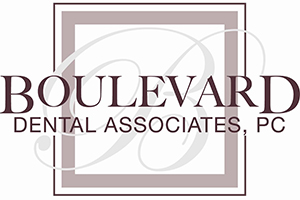
Are you embarrassed by your bad breath? Are you confused as to why you struggle with bad breath and what to do about it? We at Boulevard Dental Associates have compiled information from three online American Dental Association (ADA) articles to better educate you on the causes of and solutions for bad breath. We don’t want you to be embarrassed by your bad breath anymore!
Causes of Bad Breath
Poor Oral Hygiene:
One of the first things to consider with bad breath is your oral hygiene habits. This is so important, claims the online ADA article, “Targeting Bad Breath,” because food particles can collect along the gum line, between the teeth and on the rough surface of the tongue. The ADA article “Bad Breath, 6 Causes and 7 Solutions,” explains that there are many types of bad breath-causing bacteria that naturally live in your mouth, and these bacteria then feed on the food left in your mouth, releasing chemicals that have an odor. The article, “Bad Breath: Causes and Tips for Controlling It,” adds that this bacterial film called “plaque” can build up if not removed regularly through good oral hygiene practices.
Foods and Drinks:
Diet can also impact bad breath. Chemicals that cause odor can be absorbed into your bloodstream and from there into your lungs so that the chemicals are then exhaled or excreted in the saliva. Foods like onions and garlic, as well as diets high in protein and sugar also have been associated with bad breath (“Bad Breath: Causes and Tips for Controlling It”).
Tobacco Use:
Smoking and other tobacco products can also cause mouth odor. In addition, they can lead to an increase in gum disease, another contributor of bad breath. Finally, smoking can diminish your ability to smell so that you are not aware of your bad breath (“Bad Breath: 6 Causes and 7 Solutions”).
Dry Mouth:
The article “Targeting Bad Breath,” explains that saliva is what keeps your oral tissues moist and what helps to clean food particles from the mouth. It goes on to list the many different factors that can contribute to dry mouth, such as certain medications, salivary gland problems and tobacco use. This low saliva flow dries out your mouth, increasing the risk of bad breath. The article “Bad Breath: 6 Causes and 6 Solutions,” adds that mouth breathing can also lead to dry mouth, which in turn can cause bad breath.
Oral Diseases:
Several different types of oral diseases can cause bad breath as well. Examples of this include: infections in the mouth, such as dental caries (tooth decay), periodontal (gum) disease or mouth sores related to other conditions. Surgical wounds (i.e. from extracted teeth, can also be a culprit (“Bad Breath: Causes and Tips for Controlling It”).
Medical Conditions or Medications:
Certain medical conditions have symptoms that relate to bad breath. They include sinus or lung infections, as well as postnasal drip, tonsillitis, gastrointestinal disorders, gastric reflux, bronchitis, diabetes and some liver or kidney diseases. In addition, a number of medications may cause an unpleasant mouth odor or cause dry mouth, which in turn can lead to bad breath. You can read the side effects on medication labels to better educate yourself about such side effects, and of course, it is important to visit your healthcare provider about such concerns (“Bad Breath: 6 Causes and 7 Solutions”).
Solutions for Bad Breath
Brush and Floss:
The American Dental Association recommends brushing twice a day for two minutes with fluoride-containing toothpaste, as well as cleaning between your teeth once a day (“Targeting Bad Breath”).
Take Care of Your Tongue:
Most of the bacteria on the tongue can be found way in the back where you can see a white or brown coating. Use a toothbrush or a tongue scraper to clean out this bacteria (“Bad Breath: 6 Causes and 7 Solutions”).
Mouthwash:
While only a temporary solution, over-the-counter mouthwash can help kill bacteria or neutralize and temporarily mask bad breath. However, the longer you wait to brush and floss, the more likely you will have bad breath (“Bad Breath: 6 Causes and 7 Solutions”).
Clean Your Dentures:
Take your removable dentures out at night and brush thoroughly with a denture cleanser before putting them back in the next morning. It is recommended that you also talk to your dentist about the best way to care for and clean your dentures (“Bad Breath: Causes and Tips for Controlling It”).
Keep Saliva Flowing:
Since saliva helps to keep oral tissues moist and clean food particles from the mouth, you want to eat food that increases saliva production. Healthy foods that require a lot of chewing do just that, such as carrots or apples. Chewing sugar-free gum or sucking on sugar-free candies can also increase saliva production (“Bad Breath: 6 Causes and 7 Solutions”).
Quit Smoking:
Smoking is a dangerous habit that hurts your body and your mouth. Quitting smoking will increase your quality of life and improve your breath (“Bad Breath: 6 Causes and 7 Solutions”).
Visit Your Dentist Regularly:
Before you can do anything to help your bad breath, you must determine its cause. Your dentist can examine your mouth to help identify any oral health problems, such as gum disease, tooth decay or low salivary flow. In addition, a professional cleaning can remove hardened plaque, or tartar, along and beneath your gum line where bacteria can hide. Oral hygiene habits can also be evaluated. Then, together, you and your dentist and hygienist can go over your oral hygiene habits (“Targeting Bad Breath”).
Be prepared as well to share with your dentist any medications you are taking and any changes in your health, including temporary illnesses or the development of new health conditions. Your dentist may refer you to your physician to check for other medical causes or to go over your medications (“Targeting Bad Breath”).
The above ADA articles have demonstrated that a variety of factors can contribute towards bad breath. And while some of these factors are easier to control than others, there are proactive steps you can take to have more control over your mouth odor. We at Boulevard Dental Associates think it is really important for you to educate yourself about such matters. At the same time, it is imperative that you consult your dentist and/or physician to identify the exact causes of your bad breath and to find the solutions that are right for you.
Sources:
Targeting Bad Breath –
https://www.ada.org/en/~/media/ADA/Public%20Programs/Files/JADA_Targeting%20bad%20breath
Bad Breath: 6 Causes and 7 Solutions –
https://www.mouthhealthy.org/en/az-topics/b/bad-breath
Bad Breath: Causes and Tips for Controlling it –
http://jada.ada.org/article/S0002-8177(14)61845-6/fulltext
